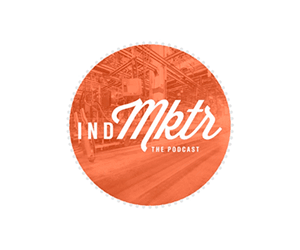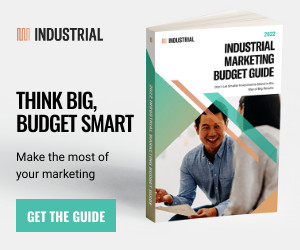In the past five to 10 years, artificial intelligence (AI) has moved from something primarily talked about on television and science-fiction novels to being a normal part of marketing technology and strategy conversations. However, whether called “machine learning,” “big data deep learning,” or some other terminology, the process of using computers to compute large amounts of information has been a key function of our marketing tech stacks for as long as we can remember. In other words, in some capacity, we’re all doing AI marketing already. But what’s new that we can leverage in our marketing efforts?
In the latest edition of the Industrial Marketer Podcast, co-hosts Joey and Nels discuss what you need to know about how artificial intelligence platforms are being introduced across the marketing spectrum so that you can begin to develop effective AI marketing strategies.
We’re talking all about ChatGPT and the latest buzz about artificial intelligence in manufacturing marketing!
5 Areas Where AI Marketing Can Make an Impact
1. Analytics and Feedback Loops
AI has the potential to provide more accurate and in-depth insights into customer behavior and preferences. That should help marketers automate tasks and provide them with a feedback loop to improve their products and services. This includes:
- Predictive analytics – One of the promises of Google Analytics 4 is to analyze large amounts of data to identify patterns and trends to help predict future customer behavior. This can be used to optimize marketing campaigns and improve lead generation and conversion rates.
- Automated campaigns – AI can help automate many tasks, such as identifying target audiences, creating and sending messages, and tracking results.
- Customer feedback analysis – AI can help you identify patterns and trends in customer sentiment. This will help you decide what to put more resources into and what to retreat from.
2. Customer Engagement and Interaction
AI has the potential to accelerate the evolution of all sorts of marketing functions that involve customer interactions. That includes:
- Conversational marketing – More personalized, efficient and human-like interactions with customers.
- Lead qualification – AI can analyze customer interactions and behavior to identify leads that are most likely to convert. Companies will have a better handle on their most valuable leads.
- Personalization – AI can help create highly personalized marketing messages, which helps move prospects and customers along in the buying journey. It also can make personalized product recommendations.
- Virtual assistants – AI marketing chatbots can provide instant, 24/7 customer service and support, answering frequently asked questions and directing customers to the appropriate resources.
3. Content Creation & Experimentation
The true benefits of AI content generation tools come from alignment of your value proposition with your target audience. The cliche “garbage in, garbage out” applies to AI tools as well. They are only as good as the instructions you provide.
In some cases, the subscription models for these tools are based on cost-per-word, so you will want to approach your proof of concepts with a clear strategy in mind. Experiment with different input parameters to see how the tool adjusts. Try different applications to see what it can do.
But do not expect magic. In all likelihood, the best you can expect for longer form content is a rough draft. The AI marketing tools we have tried do not excel at creativity and differentiation.
4. Research
Our experience with ChatGPT from OpenAI is that it is like having a great research assistant. It is a definite strength of the tool as it will answer a query as opposed to how search engines find an existing answer. As you might expect, it does better on a micro level than a macro level, though it can find pertinent industry statistics. Note that there have been concerns expressed, especially from academia, about the legitimacy of some source material.
But other AI tools have been used promisingly for some time on keyword research and idea generation. Digital marketing tools like Semrush have the ability to review topics and content types that rank highly for terms (and groups of terms) and provide starting direction on the most opportunistic keyword clusters and even the content types that would accommodate rankings for those terms — once again, acting in a similar capacity to a research assistant or junior SEO team member providing keyword universe reports. Taking the logical next step and using the information provided by a keyword research tool into something like ChatGPT could be a one-two punch to save a marketing content creator time, allowing for better targeted outputs.
5. Efficiency & Time Saving
We mentioned earlier the vast applications for saving time with other marketing tasks, from creating target lists to automating a nurturing sequence. This is the big win for AI so far.
Another strength of AI content tools is writing summaries and lists of bullet points (strengths, challenges, etc.). You can instruct AI tools to write a 100-word summary, or ask for the top 5 benefits of a tool or service. It is not yet advanced enough to write an effective blog post, but with the right set of instructions you might end up with a serviceable rough draft. And that might be enough to get you excited about AI.
Listen to the Podcast to Learn More About AI Marketing
If you have been waiting on the AI sideline for more user-friendly tools and applications, fear not. Listen to Episode 39 of the Industrial Marketer podcast to learn more about how to explore AI marketing in the manufacturing sector.
Subscribe to the Industrial Marketer Podcast
The Industrial Marketer podcast comes out once a month. To subscribe, visit our Buzzsprout show page and select your podcast platform of choice.
And if you have any ideas for topics you’d like us to cover on the podcast — or here on the Industrial Marketer website — send us a message on Facebook or Twitter and let us know!




